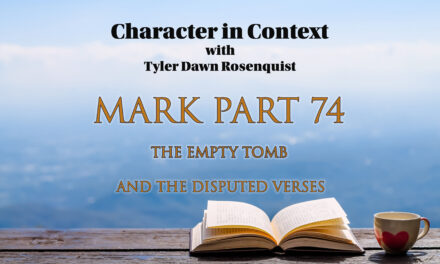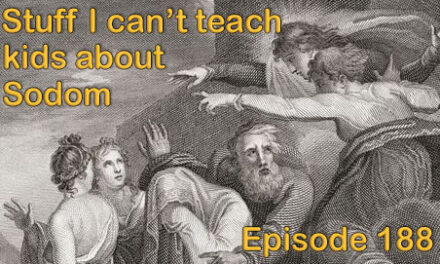Continuing with my series on the “woes” of Matthew 23. Why were the tombs whitewashed? Was it to make them prettier? Nope. Unlike last week’s episode, this one was a lot of fun for me because I just love teaching about anything Temple related. Ritual purity, and especially heading into the Passover, was incredibly important and biblically mandated. We’re going to delve into the subjects of corpse impurity from Numbers 19, and the whitewashing of the tombs from Shekelim 1.1 in the Mishnah. Perhaps most importantly for today, we are going to investigate our own level of ritual impurity in order to put other forms into perspective–especially the misplaced focus on menstrual impurity in congregations, oftentimes due to a lack of understanding of the Biblical text.
Here is the transcript, not thoroughly edited, but I am sure you can survive any grammar and spelling missteps
**********************
Did you know that you could be covered from head to toe in thick mud and be ritually clean? Did you know that you could be squeaky clean inside and out and be ritually unclean? It’s true. Ritual cleanliness is a much-misunderstood aspect of ancient life—and not just the bible. All ancient cultures had ideas about the boundaries of acceptability and they were pretty much similar, regardless of whether one was Egyptian, Babylonian or Hebrew. Certain things made people absolutely unclean, defiled, unacceptable for inclusion either in society as a whole, like leprosy, or for certain ritual activities—like participation in the ritual cult. Uncleanness could be temporary, like the types dealing with bodily secretions, or permanent, as we see in certain caste systems like India with their population of “untouchables” where certain people are considered to be born into a permanently unacceptable state and are thus inherently inferior and perpetually unworthy.
So, what was the absolute worst form of impurity in ancient Israel? Corpse impurity! But what does that have to do with the sixth woe comparing the Pharisees to unwashed tombs? Well, that’s a pretty cool story.
Hi, I’m Tyler Dawn Rosenquist and welcome to Character in Context, where we explore the historical context of Scripture and talk about how it bears on our own behavior and witness as image-bearers. You can find my teachings on my websites theancientbridge.com and contextforkids.com as well as on my youtube channels, accessible from my websites. You can also access past broadcasts on my podcast channel characterincontext.podbean.com and my context books for adults and families are available through amazon.com. And my podcasts are also available on iTunes now—however, I just saw a news story that they are about to get rid of iTunes so I may have gone to all the trouble of getting onto that for nothing. Which is pretty hilarious. I guess they are going to have separate apps for podcasts, music, and such and not lump them all together anymore.
Anyway, this week we are covering my favorite woe—woe #6. Let’s take a look at it.
27 “Woe to you, teachers of the law and Pharisees, you hypocrites! You are like whitewashed tombs, which look beautiful on the outside but on the inside are full of the bones of the dead and everything unclean. 28 In the same way, on the outside you appear to people as righteous but on the inside you are full of hypocrisy and wickedness.
I have so often seen people use “whitewashed tombs” as an insult, not really understanding anything about the cultural context—but then we have a whole internet-land filled with people who just want to grab on to any “biblical” insult they can find in order to try and sound righteous while punishing anyone who disagrees. Sometimes, that’s just putting lipstick on the pig of our overgrown egos and underdeveloped humility. I know this is going to shock you guys, but sometimes people disagree with me because I am wrong. I know, I know, let me give you a minute to pick yourselves up off the floor from the shock of it all. But seriously, sometimes people disagree with you because you’re wrong too, which is why Yeshua/Jesus repeats over and over again, “Anyone who humbles himself shall be exalted and anyone who exalts himself shall be humbled.” Nothing and I mean nothing, is more humiliating than being a jerk and then finding out you were wrong and need to apologize—in fact, it is so awful that a great many people, even once they find out they were colossally wrong, can’t even bring themselves to face and/or admit it. They might sidestep and just start teaching the new thing without admitting their old error, or ignore that they were wrong and come at their debunked belief from a new angle, just trying to find a new way to be right when they are actually wrong. Embrace wrongness—embrace the knowledge that you are wrong about stuff you fervently believe. You just don’t know what those things are yet.
But, whitewashed tombs. There is a misconception out there that tombs were whitewashed for the purpose of beautifying them, but that was just a side-effect. Remember the audience was Jewish pilgrims who had just traveled to Jerusalem from Judea, Galilee, Perea, the Transjordan and even some from the diaspora communities—which means communities of Jews outside of the Land from places like Babylon, where the trip would have taken a great many weeks. Ezra’s journey took four months, of course, he was traveling with families, and a pilgrimage trip would probably only be wealthy males. It was a 900-mile trip. In the first century, the two largest and wealthiest diaspora communities on earth were from Babylon (most Jews never returned to Israel) and Alexandria in Egypt. It was considered a goal among the wealthy (and most diaspora Jews weren’t wealthy, most were slaves or at least very poor) to visit the Temple in Jerusalem once in a lifetime. After all, the journey took so long that you were gone for months even to attend a single feast, there was no chance of going back and forth. In Acts 24, Paul talks about having been outside of the land for years and finally returning for the Feast of Unleavened Bread/Passover
So I always take pains to have a clear conscience toward both God and man.17 Now after several years I came to bring alms to my nation and to present offerings.
Now, I am very much in agreement with the decades-old “new perspective on Paul” within Christian scholarship where we see that Paul never stopped being a Jew and never stopped being Torah observant. But the Gospel would never have spread beyond Israel if the Jews at this point, who were living in the diaspora, were returning three times a year for the Feasts. He had been gone for several years.
So, we have this pilgrimage from all over ending up at Jerusalem for the Passover, which was the Feast that most diaspora Jews strove to attend when they could go. But we have this problem of ritual purity. Most forms of ritual impurity were easily “cured.” Immerse in a ritual bath and be qualified for Temple attendance and the eating of holy meat by sundown. Easy peasy, hot and cheesy. But corpse impurity was something entirely different and we need to start this story in Numbers 19 with the Red Heifer. I am going to skip the preparation of the water for purification and go right to the problem and cure of ritual impurity.
11 “Whoever touches the dead body of any person shall be unclean seven days. 12 He shall cleanse himself with the water on the third day and on the seventh day, and so be clean. But if he does not cleanse himself on the third day and on the seventh day, he will not become clean.13 Whoever touches a dead person, the body of anyone who has died, and does not cleanse himself, defiles the tabernacle of the Lord, and that person shall be cut off from Israel; because the water for impurity was not thrown on him, he shall be unclean. His uncleanness is still on him.
14 “This is the law when someone dies in a tent: everyone who comes into the tent and everyone who is in the tent shall be unclean seven days. 15 And every open vessel that has no cover fastened on it is unclean. 16 Whoever in the open field touches someone who was killed with a sword or who died naturally, or touches a human bone or a grave, shall be unclean seven days. 17 For the unclean they shall take some ashes of the burnt sin offering, and fresh[a] water shall be added in a vessel. 18 Then a clean person shall take hyssop and dip it in the water and sprinkle it on the tent and on all the furnishings and on the persons who were there and on whoever touched the bone, or the slain or the dead or the grave. 19 And the clean person shall sprinkle it on the unclean on the third day and on the seventh day. Thus on the seventh day he shall cleanse him, and he shall wash his clothes and bathe himself in water, and at evening he shall be clean.
20 “If the man who is unclean does not cleanse himself, that person shall be cut off from the midst of the assembly, since he has defiled the sanctuary of the Lord. Because the water for impurity has not been thrown on him, he is unclean. 21 And it shall be a statute forever for them. The one who sprinkles the water for impurity shall wash his clothes, and the one who touches the water for impurity shall be unclean until evening. 22 And whatever the unclean person touches shall be unclean, and anyone who touches it shall be unclean until evening.”
Last week I read from Berakhot 8.2 where we saw in the Kehati commentary, in the introduction, that corpse impurity was considered the Avi Avot hatum’ah—literally the father of fathers of impurity. I call it the grand-daddy of defilement. It’s the grand kahuna of being ritually unclean—the corpse. No living person is this unclean, mind you, but a dead person is. A corpse is so unclean that a High Priest couldn’t even attend a family member’s funeral, or visit the body after death. If you are even in the same room with a corpse, you are Av hatum’ah, “father of impurity.” And this is totally biblical. And so, taking a sidestep away from the main teaching here—what does it mean for us when there are no red heifer ashes? It means that everyone, Jew and Gentile, has incurable ritual impurity. We are all “fathers of impurity.” Unless you have been sequestered away all your life and have never been around a dead person, never were in a church for a funeral, and never sat shiva with a grieving family—you have serious ritual impurity. I want you to think about this the next time someone gives you the stink eye, if you are a woman, for menstrual impurity—because it is only traditional to make a fuss over this as though the corpse impurity doesn’t exist—everyone gets a big fat pass on that one—even though we all know have the equivalent impurity level of being in a continual state of niddah (menstrual), of being a zav or zavah (someone who has an abnormal emission), or a metzora (diseased, often translated leprosy), and that’s both male and female. I am not saying to not be mindful of observing God’s laws concerning niddah, but let’s seriously keep it in perspective—we ladies aren’t contaminating anyone beyond their permanent level of impurity.
Back to corpses. Corpses don’t seem to have an expiration date on being instruments of ritual defilement and actually, there are several instances in Scripture of very old bones being used to defile pagan altars. During the first century, it is reported that the Samaritans tried to defile the Temple Mount with human bones because they were so outraged at the Temple being in the wrong place (they worship on Mt Gerizim to this day). So, still, though, defilement wasn’t a big hairy deal as long as you had seven days warning before going to the Temple, because that’s how long purification took. Let’s reread the verses for today so we don’t forget the point of all this:
27 “Woe to you, teachers of the law and Pharisees, you hypocrites! You are like whitewashed tombs, which look beautiful on the outside but on the inside are full of the bones of the dead and everything unclean. 28 In the same way, on the outside you appear to people as righteous but on the inside you are full of hypocrisy and wickedness.
Well, here we have Yeshua verifying that everything inside a tomb is unclean. But what’s the big deal? Well, just imagine taking a nice family trip to Jerusalem for Passover. Little Johnny, or Yohanny I guess, needs to pee. He wanders off the path and finds himself peeing on the stone covering a tomb entrance. They weren’t all huge and obvious. Oh no, little Johnny has encountered Avi Avot Hatum’ah and now he is Av Hatum’ah and everything the little rascal touches is ritually defiled in the first degree, one step down from Johnny and two steps down from a corpse. Johnny can’t participate in the Passover and it is going to be really tough for the rest of the family to not be repeatedly defiled by him. All they have to do is ritually wash and be clean once the sun sets, but Johnny needs a seven-day purification ritual. This has just gotten ugly in the extreme. But wait, they had already enacted some laws concerning this that aren’t specifically in the Bible but derived from the requirements for ritual purity when eating the Passover.
Let’s look at Shekalim 1.1, which is found in Seder Moed, concerning the Feasts, wedged in between Pesachim and Yoma—the tractates concerning Passover and Yom Kippur. Again, I am reading out of the Kehati commentary, as usual.
We see here a few things—one, the specific timing of the collection of the Temple tax, which shows up in the Gospels, and the need to refurbish the mikvaot, the ritual baths, at the end of winter because they were often rendered unusable in the winter. Again, so much for the myth of perpetual ritual purity in ancient times. It could be extremely difficult and sometimes even impossible, and they clearly point that out here. When spring came, they needed those baths in working order for the beginning of the Feast year, which began with the beginning of months in the month of Nisan, as opposed to the beginning of the agricultural and civil year, as we see in the Gezer calendar, beginning in the seventh month. We also see this in the beginning and end of the shemittah cycles and the tithe years, all occurring in the seventh month. It’s just like modern times where we have multiple calendars—tax year, school year, civil year, etc…
But most important to this week’s study is the whitewashing of the tombs. This was done specifically so that little Johnny can’t stumble across one accidentally and become defiled for the Passover. Like I said, not commanded in the Bible, but obviously an excellent and much-needed idea. And that is what a lot of the Mishnah is about—not the nitpicky debatable stuff like last week’s topic but solid practical application of how Torah was lived out in those times and in a Temple-centered society. Getting seriously ritually defiled within a week of Passover meant “game over. Try again next month for Second Passover,” which isn’t like second breakfast, okay? You had to come back a month later and hope it didn’t happen again, so no extra juice boxes for little Johnny.
So as they would make the pilgrimage from home to Jerusalem, they would see those family tombs, gleaming from being painted with white lime. And when people saw them, their reaction wasn’t “Oh how pretty”—I was “KEEP AWAY.” You know, like bears are nice looking, as long as you are in your car. Or a swarm of bees—on your television set, or out pollinating a field of flowers. Skunks are cute too—but not up close. Or my husband’s evil cat and no that was not a joke. You have no idea. Sometimes when I am recording she pounds on the door, “baboom baboom baboom” just like the telltale heart.
Whitewashed tombs, they looked nice but people saw the whitewash as a clear warning—and that is what Yeshua is saying about the Pharisees and their scribes. He is telling people to walk the other way when they see them coming, to stay clear, to avoid them lest they become defiled.
Remember from part one of this series, polemic was about a battle for authority over who was the most suitable teacher and who had the legitimate school of thought. The Essenes did it, the Pharisees did it, the Greek philosophical schools did it. This was a battle for the hearts and minds of the gathered Passover pilgrims—this was Messiah saying that He was the only completely authoritative and legitimate arbiter of the law. Other groups might get things right, and sometimes vey wrong, like the Hillel ruling allowing divorce for any cause, but they were human and flawed. Messiah is the representation of God’s absolute wisdom in the flesh and His teachings were always absolutely correct. The Pharisees, who called themselves guides to the blind, were leading people away from God by undermining Yeshua and leading people away from Him. They were insulting God by failing to recognize His character perfectly revealed in Yeshua. As such, they were a dangerous and defiling influence at this time within Judaism. It wasn’t about their oral traditions, it was about their influence and how they were using it to keep people out of the Kingdom of Heaven. This is all going to culminate in the grand finale in the teachings over the next two weeks, but now we are beginning to start to see the larger picture:
First, they get rebuked for coveting and misusing authority.
Second, they get rebuked for going to great lengths to get people to join their faction, while separating any converts from Yeshua through their constant attempts to undermine Him with their nitpicking and outright lies at times (accusing him of being demon-possessed and a Samaritan).
Third, they get rebuked for bringing God and His Temple to shame with their mockery of oaths, creating loopholes that give them the ability to weasel their way out of oaths.
Fourth, they are focused on their own wellbeing—micromanaging their tithing in order to maximize their observance of the commandment—while being blind to the needs of the recipients of the tithe—the poor and vulnerable who need mercy and justice.
Fifth, they are overly focused on the legalities of cleansing cups and pots and beds, while neglecting the circumcision of their own hearts.
Sixth, they are straight up a defiling influence among the Jews for their part in the rejection of the Messiah among the Judeans.
There is one more woe to go, and then Yeshua is going to leave the Temple for the last time, and that is going to hearken back to the Book of Ezekiel.





















